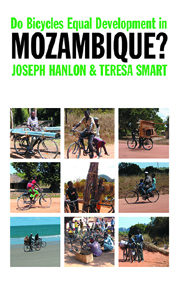Book contents
- Frontmatter
- Contents
- Acknowledgements
- The authors
- Money & measurements
- Abbreviations, acronyms & glossary
- Part I IS THERE DEVELOPMENT IN MOZAMBIQUE?
- Part II ACTORS & CONTEXT
- 9 Frelimo & the democratic one-party state
- 10 Corruption, rent-seeking, reform & a divided elite
- 11 Aid dependence & subservience: carrots & sticks
- 12 On the edge of the world
- Part III ALTERNATIVES & THE DEVELOPMENTAL STATE
- Appendix 1 Aid
- Appendix 2 Investment & other tables
- Bibliography
- Index
11 - Aid dependence & subservience: carrots & sticks
from Part II - ACTORS & CONTEXT
Published online by Cambridge University Press: 05 April 2013
- Frontmatter
- Contents
- Acknowledgements
- The authors
- Money & measurements
- Abbreviations, acronyms & glossary
- Part I IS THERE DEVELOPMENT IN MOZAMBIQUE?
- Part II ACTORS & CONTEXT
- 9 Frelimo & the democratic one-party state
- 10 Corruption, rent-seeking, reform & a divided elite
- 11 Aid dependence & subservience: carrots & sticks
- 12 On the edge of the world
- Part III ALTERNATIVES & THE DEVELOPMENTAL STATE
- Appendix 1 Aid
- Appendix 2 Investment & other tables
- Bibliography
- Index
Summary
In early 2007 the IMF reported (IMF, 2007c: 4) ‘Mozambique is a success story in sub-Saharan Africa, benefiting from sustained large foreign aid inflows, strong and broad-based growth and deep poverty reduction.’ A joint donor-government study in early 2007 stated ‘Mozambique is generally considered an aid success story.’ But this study also ‘revealed a widespread perception that Government leadership and ownership of the aid agenda has left donors in the driver's seat.’ In a 2004 study, Tony Hodges and Roberto Tibana stated ‘high aid dependence means that the budget process essentially involves only two actors, the executive and foreign donors. Accountability to donors is much stronger than it is to Mozambican society’ (Hodges and Tibana 2004: 8).
Is Mozambique seen as a success precisely because it has succumbed to donor demands? In an ironically titled 2005 report Perfect Partners, Tony Killick, Carlos Nuno Castel-Branco and Richard Gerster said:
Mozambique appears as many (but not all) aid-dependent countries, with the government apparently believing that its undoubted reliance on foreign assistance means that it is not in a position to insist on its own priorities. While there is no avoiding the truth that the bargaining position of the government vis-à-vis its development partners is, and will remain, highly unequal, we would like to stress that aid dependency does not have to entail subservience, and that boldness by the government can go part way to redressing the asymmetry … Donors are anxious to maintain active and substantial programmes of assistance to Mozambique, a fact which gives the government genuine bargaining strength
(Killick et al. 2005: 50).- Type
- Chapter
- Information
- Do Bicycles Equal Development in Mozambique? , pp. 119 - 136Publisher: Boydell & BrewerPrint publication year: 2008



